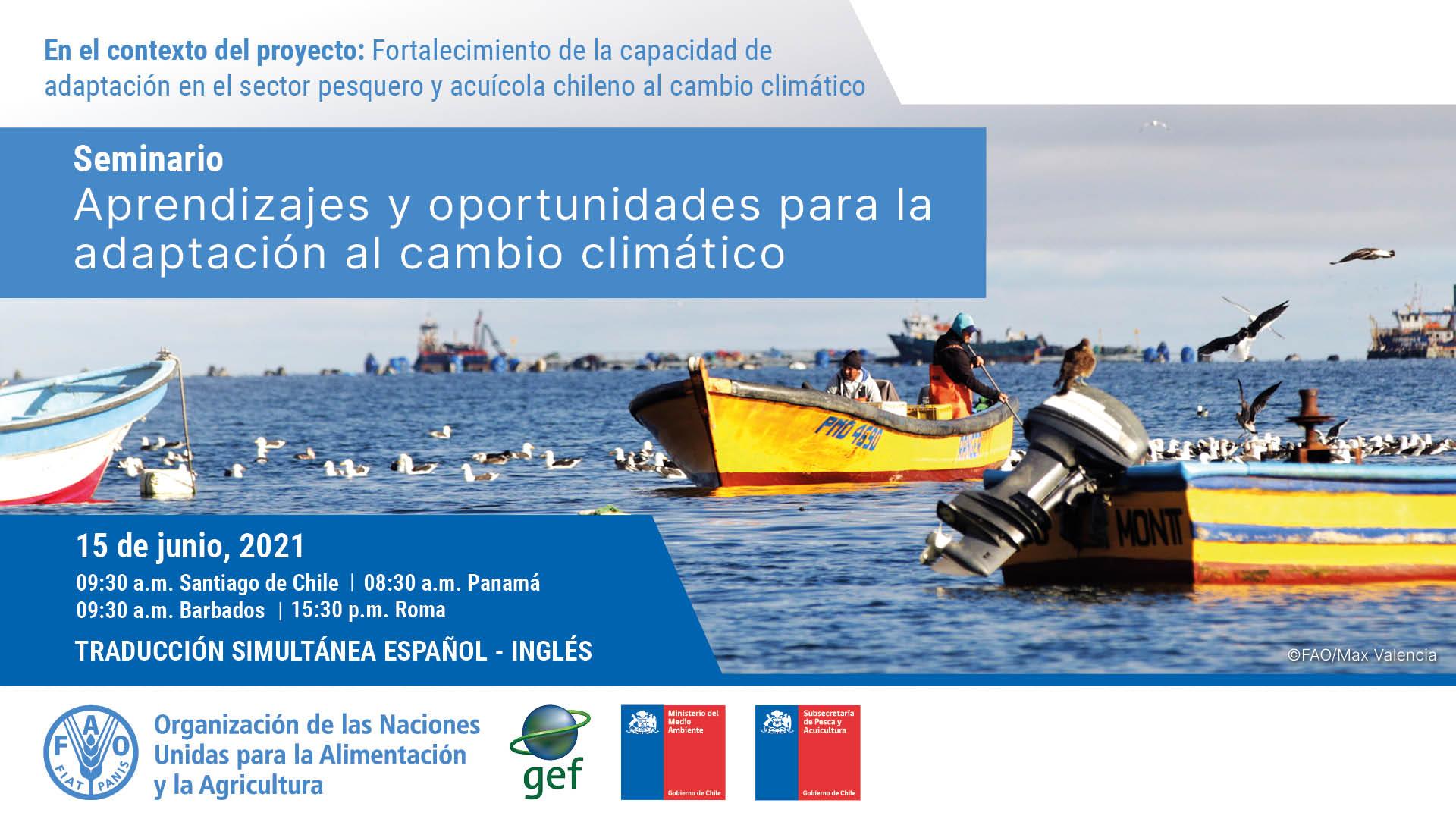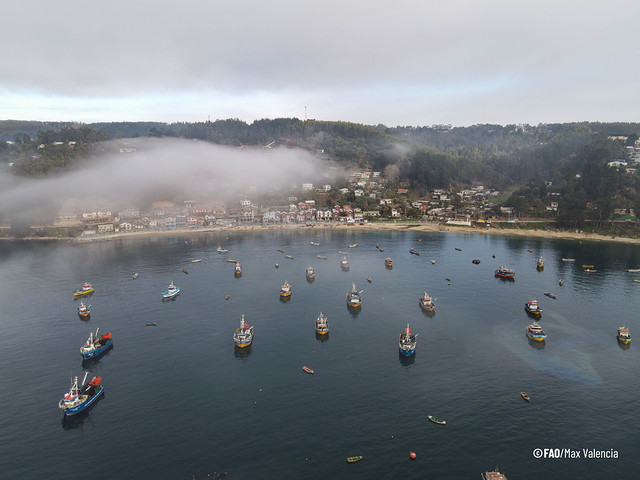Lessons and opportunities on adaptation to climate change in the context of the project "Strengthening the adaptive capacity to climate change in the fisheries and aquaculture sector of Chile"
Hybrid Event, 15/06/2021

Documentary video with testimonies of the project
Live broadcast closing seminar - June 15th 2021 09:30 hrs. Chile time.
Background
We cordially invite you to participate in the closing seminar and future prospects of the project entitled "Strengthening the adaptive capacity to climate change in the fisheries and aquaculture sector of Chile ", on Tuesday, 15 June, from 9:30 a.m. to 1:30 p.m. (Local Time Chile).
Climate change is a reality for the entire planet, and Chile is no exception. The country has one of the highest degrees of vulnerability to this global phenomenon, a condition that has become evident on a daily basis, with environmental, social and economic consequences.
This phenomenon is affecting different production sectors, including fisheries and aquaculture, which will have to face new climatic scenarios, and take urgent actions to support and promote their adaptation to this new reality.
Permanent education and training, diversification of productive activities and relevant regional field services, as well as governance systems coordinated with local actors, are part of the key actions to reduce the vulnerability of coastal communities to the consequences of climate change. Advancing in this process will mean transforming cultures and practices that should generate sustainable livelihoods for thousands of artisanal fishers and small-scale aquaculturists.
Objectives of the activity
Authorities and experts will explain why it is important for artisanal fisheries and small-scale aquaculture to adapt to climate change and will present concrete advances in the context of public policies and instruments designed to face climate change in Chile.
The seminar will include presentations on threats and risks of climate change impacts, national efforts in public policy on adaptation to climate change and its linkages with the ocean, fisheries and aquaculture. In addition, testimonies from artisanal fishers and small-scale aquaculturists on adaptation to climate change will be presented. During the virtual meeting, the future prospects of the project results will be presented.
The Project "Strengthening the adaptive capacity to climate change in the fisheries and aquaculture sector of Chile " is executed by the Undersecretariat of Fisheries and Aquaculture (SUBPESCA) and the Ministry of the Environment (MMA), and implemented by the Food and Agriculture Organization of the United Nations (FAO), with funding from the Global Environment Facility (GEF).
The project’s objective is to reduce vulnerability and increase the adaptive capacity to climate change in Chile’s artisanal fisheries and small-scale aquaculture sector. The pilot project, which started in April 2017 and ends in June 2021, is implemented in four pilot coves: Caleta Riquelme, in the Tarapacá region; Caleta Tongoy, in the Coquimbo region; Caleta Coliumo, in the Biobío region; and Caleta El Manzano-Hualaihué, in the Los Lagos region.
Photo gallery of the project
Program
09:30 – 09:40 Opening remarks by the Undersecretary of Fisheries and Aquaculture (SUBPESCA), Chile Alicia Gallardo Lagno.
09:40 – 09:50 Opening remarks from the Undersecretary of the Environment, Chile, Javier Naranjo Solano.
09:50 – 10:00 Opening remarks by the FAO Representative in Chile, Eve Crowley.
10:00 – 10:20 Risks in the face of climate change in artisanal fisheries and aquaculture in Chile and selected key adaptation measures by the sector. Doris Soto, Senior Scientist Interdisciplinary Center for Aquaculture Research, Chile.
10:20 – 10:40 National efforts in public policy climate change adaptation and links to ocean, fisheries and aquaculture. Carolina Urmeneta, Head Ofice of Climate Change Ministry of the Environment, Chile.
10:40 – 11:00 Advances in the adaptation process to climate change in the coastal marine ecosystem of Peru. José Zavala, National Coordinator of the Coastal Marine Adaptation Project, Peru.
11:00 – 11:20 Adaptation of artisanal fisheries and small-scale aquaculture to climate change. Results and lessons learned in 4 pilot coves: how to progress to smart coves. Rubén Pinochet, Profesional Senior SUBPESCA.
11:20 – 11:40 Questions to the Panel Members. Cristian Espinoza Montenegro, Chief Fisheries Development Division of SUBPESCA, Chile.
11:40 – 11:50 Break
11:50 – 12:10 Testimonials from selected beneficiaries on climate change adaptation. Short video of women and men flshers and aquaculturists.
12:10 – 12:30 Municipality of Hualaihué, Los Lagos Region: advancing towards climate change adaptation. Freddy Ibacache Muñoz, mayor of the Municipality of Hualaihué and elected councilor.
12:30 – 12:50 Project results and lessons uptake from the Regions. Moyra Rojas Tamborino, Regional Head of Environment, Tarapacá Region, Chile.
12:50 – 13:10 Project results and future prospects. Alicia Gallardo Lagno, Undersecretary of Fisheries and Aquaculture.
13:10 – 13:20 Comments from the participants and questions to the Panel Members. Maritza Jadrijevic, Coordinator of the Area on Adaptation to Climate Change and Competence Ofice of Climate Change, Ministry of the Environment.
13:20 – 13:30 Closing remarks. Eve Crowley, FAO Representative in Chile.
Documents
Related publications
- Project brochure (spanish only)
- Basic guide - Climate change fisheries and aquaculture (spanish only)
Related links
- Subsecretaría de Pesca y Acuicultura
- Ministerio del Medio Ambiente
- Fondo para el Medio Ambiente Mundial
Video
Contact
Contact
Roberto DeAndrade
Consultor en monitoreo y evaluación
Proyecto GEF-FAO Chile
Av. Dag Hammarskjöld #3241, Vitacura, Santiago de Chile
Organización de las Naciones Unidas para la Alimentación y la Agricultura
www.fao.org/chile

